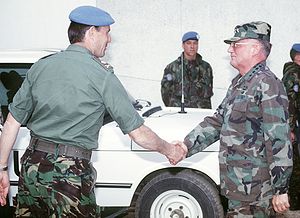- Michael Rose (British Army officer)
-
Sir Michael Rose 
Michael Rose (left) with John Shalikashvili in 1994Born 1940
British IndiaAllegiance  United Kingdom
United KingdomService/branch  British Army
British ArmyYears of service 1959 – 1997 Rank General Commands held Special Air Service
Director Special Forces
2nd Infantry Division
Staff College, Camberley
UK Field Army
UNPROFORBattles/wars Falklands War
Bosnian WarAwards Knight Commander of the Order of the Bath
Commander of the Order of the British Empire
Distinguished Service Order
Queen's Gallantry Medal
South Atlantic Medal
Mentioned in DespatchesGeneral Sir Hugh Michael Rose KCB, CBE, DSO, QGM (born 1940 in what was then British India), often known as Mike Rose, is a retired British Army General. As well as commanding 22 Special Air Service Regiment, he was Commander UNPROFOR Bosnia in 1994 during the Yugoslav Wars.
Contents
Early life
The stepson of British author John Masters, Rose was educated at Cheltenham College, St. Edmund Hall, Oxford, and the Sorbonne. He was commissioned into the Gloucestershire Regiment Territorial and Army Volunteer Reserve (TAVR) in 1959, and transferred to the Royal Air Force Volunteer Reserve (RAFVR) in 1962. He joined the Coldstream Guards in 1964.
Military career
After attending the Staff College, Camberley, Rose became the Brigade Major 16th Parachute Brigade from 1973 until 1975. He was Commanding Officer of the 22 SAS Regiment from 1979 to 1982, as part of which he was in control of the operation to free the hostages of the Iranian Embassy Siege in 1980. He commanded Special Service operations in-theatre during the Falkland Conflict. He then served as the commander of the 39th Infantry Brigade from 1983 to 1985.[1] In 1987, Rose was the Commandant of the School of Infantry until 1988,[1] when he became the first Director Special Forces until 1989.[1] He attended the Royal College of Defence Studies.[2]
Rose was General Officer Commanding North East District and Commander 2nd Infantry Division based in York from 1989 to 1991,[1] and between 1991 and 1993 served as Commandant of the Staff College, Camberley.[1] Then, from 1993 to 1994, Rose was Commander UK Field Army and Inspector-General of the Territorial Army.[1] Finally, from 1994 to 1995 he was Commander, United Nations Protection Force, Bosnia-Herzegovina.
Rose became Adjutant-General and Aide-de-Camp General to The Queen in 1995 until he retired in 1997.[1]
Rose was awarded the Queen's Gallantry Medal 1981, made a Commander of the Order of the British Empire 1986, was knighted with a knight Commander of the Order of the Bath 1994, and received the Distinguished Service Order in 1995.
He had extensive experience worldwide, particularly in the Middle East, as a special forces officer. Rose served in Germany, Aden, Malaysia, the Gulf States, Dhofar, and in Northern Ireland and the Falkland Islands, for both of which he was Mentioned in Despatches, mostly in a relatively informal, small formation setting, working to very narrow objectives, with clearly superb results.
He was called as a witness by Serbia and Montenegro in a case held at the International Court of Justice.[3]
He was also Colonel of the Regiment of the Coldstream Guards.
Other occupations
Rose is a director of Control Risks Group, a private security and consulting company.
Opposition to Tony Blair
In 2006 he came once again to public attention when he criticised British Prime Minister Tony Blair, and called for his impeachment for leading the country to war in Iraq under false pretenses. This highlighted the unease felt in the highest levels of the British armed forces about the legality, and indeed the practicality, of the 2003 American-led invasion of Iraq.
On 9 January 2006, Rose called for Tony Blair to be impeached over the 2003 Invasion of Iraq, saying on BBC Radio 4's Today programme "To go to war on what turns out to be false grounds is something that no one should be allowed to walk away from."
In 2007, he called for the admission of defeat and withdrawal of Coalition forces from Iraq describing the war as "hopeless" and comparing the situation to that faced by the British during the American Revolutionary War.[4]
References
Further reading
- Brendan Simms (2001), Unfinest Hour: Britain and the Destruction of Bosnia, Allen Lane The Penguin Press
External links
Military offices Preceded by
Michael WilkesDirector Special Forces
1988–1989Succeeded by
Jeremy PhippsPreceded by
Murray NaylorGeneral Officer Commanding the 2nd Infantry Division
1989–1991Succeeded by
Michael WalkerPreceded by
William RousCommandant of the Staff College, Camberley
1991–1993Succeeded by
Christopher WallacePreceded by
Sir Michael WilkesCommander UK Field Army
1993–1994Succeeded by
Sir Richard SwinburnPreceded by
Sir Michael WilkesAdjutant General
1995–1997Succeeded by
Sir Alexander HarleyCategories:- 1940 births
- Living people
- British Army generals
- Special Air Service officers
- British Army personnel of the Falklands War
- Royal Air Force officers
- Alumni of St Edmund Hall, Oxford
- Old Cheltonians
- Knights Commander of the Order of the Bath
- Commanders of the Order of the British Empire
- Companions of the Distinguished Service Order
- Recipients of the Queen's Gallantry Medal
- Graduates of the Staff College, Camberley
Wikimedia Foundation. 2010.
